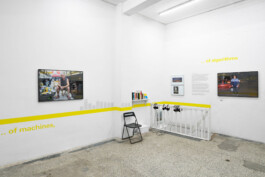
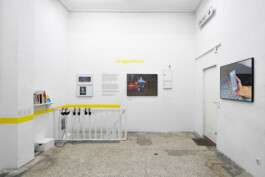
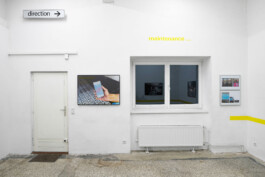

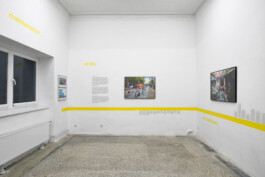
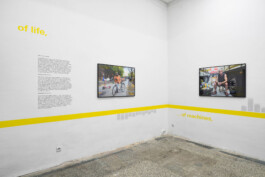
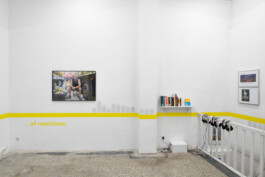
Just in Time is a cooperation of Laura-Solmaz Litschel and Marinus Reuter, that was taking place at the hinterconti exhibition space in Hamburg in December 2024.
The internet as a social interface has been loaded with virtuous strategies since its inception in 1960s California. The cultural values it conveyed at the turn of the millenium, the free movement of information and universal participation in knowledge, offered a social contract from technology. This exhibition scrutinizes how economic difference was created from the dissemination of cultural value through technology, and how this set into action an unequal exchange of goods and services.
A rift between a creative and culture class, which lives virtuously, and low-paid digital service workers, that runs through our technological imaginary, has been anticipated in the writings by Barbara and John Ehrenreich in their concept of the Professional and Manegerial Class, and more recently has been described in Andreas Reckwitz’s The Society of Singularities.
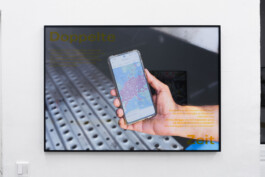
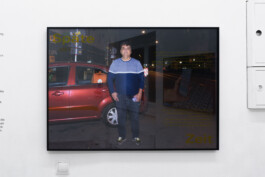
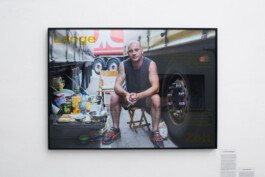
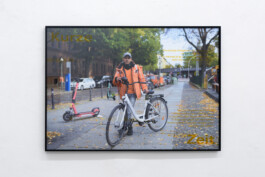
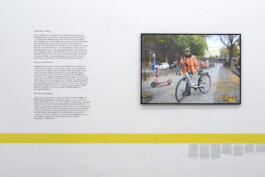
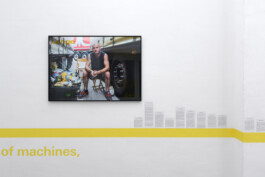
The exhibition on the issue of digital labor and its role in social reproduction today was an experiment in interdisciplinary exhibition making, and staged a split between the faculties of knowledge and of the sensual. The room installation combined an informative approach, based on social sciences research, with photography.
The four tableaus by Marinus Reuter, depicting workers of digital services, utilize both language and image. Visually, the photographic images exploit a dead-pan convention of the frontal portrait, known from documentary photography.
In superimposed, transparent vinyl text, responses taken from interviews with the photographic subjects on their use of free time vis-à-vis working time are presented. The piece investigates time as a modality of social conflict as well as of business interest, and presents workers’ strategies of resistance against and within a social time created by distribution.
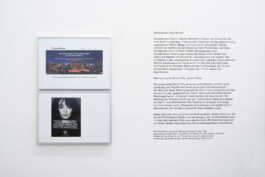
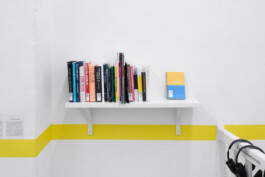
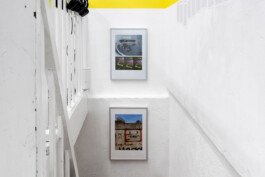

Research results from Laura-Solmaz Litschel, presented as wall text, as well as Litschel’s condensed argument of digital service work as “maintenance of life” and reproductive labor, derived from her dissertation “Digitalisierte Nachtarbeit – Gig Work und Migration in der Smart City Berlin,” structure the street level exhibition space along a yellow timeline.
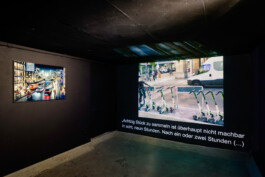
In the lower-level room, a film that gathers Laura-Solmaz Litschel’s research interviews with employees from early phase, unregulated gig work in the city of Berlin was presented.







Just in Time is a cooperation of Laura-Solmaz Litschel and Marinus Reuter, that was taking place at the hinterconti exhibition space in Hamburg in December 2024.
The internet as a social interface has been loaded with virtuous strategies since its inception in 1960s California. The cultural values it conveyed at the turn of the millenium, the free movement of information and universal participation in knowledge, offered a social contract from technology. This exhibition scrutinizes how economic difference was created from the dissemination of cultural value through technology, and how this set into action an unequal exchange of goods and services.
A rift between a creative and culture class, which lives virtuously, and low-paid digital service workers, that runs through our technological imaginary, has been anticipated in the writings by Barbara and John Ehrenreich in their concept of the Professional and Manegerial Class, and more recently has been described in Andreas Reckwitz’s The Society of Singularities.






The exhibition on the issue of digital labor and its role in social reproduction today was an experiment in interdisciplinary exhibition making, and staged a split between the faculties of knowledge and of the sensual. The room installation combined an informative approach, based on social sciences research, with photography.
The four tableaus by Marinus Reuter, depicting workers of digital services, utilize both language and image. Visually, the photographic images exploit a dead-pan convention of the frontal portrait, known from documentary photography.
In superimposed, transparent vinyl text, responses taken from interviews with the photographic subjects on their use of free time vis-à-vis working time are presented. The piece investigates time as a modality of social conflict as well as of business interest, and presents workers’ strategies of resistance against and within a social time created by distribution.




Research results from Laura-Solmaz Litschel, presented as wall text, as well as Litschel’s condensed argument of digital service work as “maintenance of life” and reproductive labor, derived from her dissertation “Digitalisierte Nachtarbeit – Gig Work und Migration in der Smart City Berlin,” structure the street level exhibition space along a yellow timeline.

In the lower-level room, a film that gathers Laura-Solmaz Litschel’s research interviews with employees from early phase, unregulated gig work in the city of Berlin was presented.